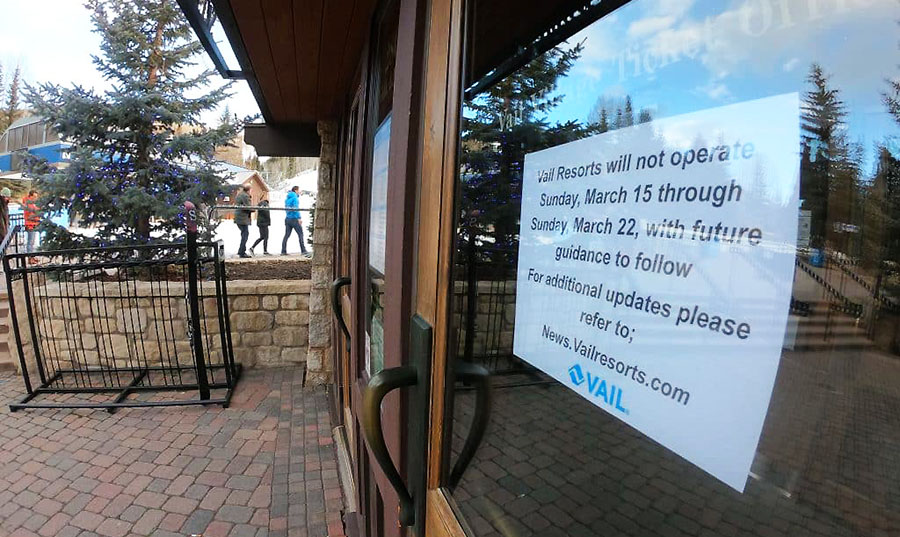By Eric Smith
<span style="color: #a3a3a3;">This past Saturday afternoon, around the time that lifts stopped spinning in the Rocky Mountains, the world’s largest ski resort owner and operator said it would shut down its North American ski area operations for a week.
The coronavirus had struck again. And the announcement from Vail Resorts Inc. created an inflection point for the industry as most other resorts followed suit by shutting down for at least a week if not for the remainder of the season.
“This decision provides a pause for the entire ecosystem of our mountain resort communities,” said Vail CEO Rob Katz. “It gives everyone the time to assess the situation, respond to ever-changing developments, and evaluate the approach for the rest of season, if we believe it is advisable or feasible to re-open. This was not an easy decision to make, as we deeply considered the impact it will have on our guests, employees, and the people and businesses in our communities.”
Vail’s move to suspend operations for at least a week, from March 15-22, prompted competitors to issue their own version of closures—either permanently for the season or temporarily. Before long the governor of Colorado ordered all ski resorts in the state to close.
Alterra Mountain Co., Aspen Skiing Co. and Powdr Corp. all said they would either close for the season or perhaps reopen in a week or two in hopes of capturing the busy spring crowds. Others, including Telluride and Arapahoe Basin, did the same.
“After careful thought and deliberation of our duty in the face of the Covid-19 (coronavirus) outbreak, and in what I believe is in the best interest of our guests, employees and local communities, Alterra Mountain Company will suspend operations at our 15 North American ski resorts, starting the morning of Sunday, March 15, until further notice,” said Alterra CEO Rusty Gregory. “All lift operations, food and beverage, retail and rental services will be closed until further notice.”
Park City, UT-based Powdr made a similar statement on its website. In addition to ski resorts, the adventure lifestyle company also includes the Woodward indoor/outdoor experiential action sports camps and a heli-adventure operation.
“Suspending our operations is a necessary step for us to take in support of our local communities’ and the nation’s efforts to limit the spread and risks associated with Covid-19,” said Wade Martin, Powdr co-president. “This is an unusual and dynamic situation, however, we continue to believe outdoor mountain recreation provides a meaningful escape to nature, which is what made this a difficult decision, but the correct decision for now.”
By Sunday, most ski resort owners had posted some type of alert about their operations grinding to a halt, even as tourists were surely pouring into their mountain towns for spring break ski trips.
“Our plan is to conduct some limited on-mountain maintenance to potentially have a limited late season opening if circumstances allow,” Aspen Snowmass posted on its site. “We are all skiers at heart and we understand the therapeutic nature of our shared passion. Extreme circumstances call for extreme actions, and we make this decision in coordination with our local and state health agencies.”
…
Vail was the biggest resort operator to announce closures, but it wasn’t the first. Late last week, Berkshire East and Catamount in Massachusetts closed, as did Taos Ski Valley in New Mexico, Jay Peak Resort in Vermont and Shanty Creek Resort in Michigan. Those followed ski resorts in Europe, where the coronavirus has been especially rampant.
The state of Colorado got involved because ski resort-heavy counties such as Summit, Eagle, Pitkin and Gunnison had been reporting as many coronavirus infections as larger cities like Denver.
Gov. Jared Polis issued a written statement on Saturday evening that read, in part: “Never would I have believed that a global pandemic would force the temporary closure of our world-class ski resorts. I have been skiing since I was 4 years old. Our family has had a place in Vail for three decades. And, like so many Colorado families, we were planning a ski trip with our kids over their spring break next weekend. Beyond being a major part of our way of life, skiing supports our workers and businesses.
“It is with a profound sense of pain and grim responsibility that I take the agonizing action that this moment demands. I take solace in knowing that while we will be temporarily closed for business, we will be saving the lives of hundreds, perhaps thousands of Coloradans in the days and weeks ahead.”
The move is a huge blow to the industry, which could see staggering financial losses in ticket sales, lodging, rentals, retail, and food and beverage. But in light of the rapid spread of the coronavirus, especially in tourism hotbeds, the closures make sense. Ski resort economic losses pale in comparison to the damage that could be done with outbreaks of Covid-19 within their employee and guest communities.
The National Ski Areas Association sent the following statement to SGB Executive on Monday morning: “NSAA has issued guidance to its member ski areas, including the latest updates from the CDC and WHO, and both operational and communications resources specific to the ski industry. We are in contact with individual resorts and ownership groups, and support the decisions they are making in response to their own unique, localized situations. NSAA staff continues to monitor and respond to this rapidly evolving situation.”
As the only publicly traded company in this mix, Vail is sure to downgrade its already dismal outlook. The company last week withdrew its guidance for the fiscal year because of the impact the coronavirus has already had on mountain operations. Look for the company’s update later this week to reflect steepened losses.
“In the week ended March 8, 2020, the company saw a marked negative change in performance from the prior week, with destination skier visits modestly below expectations,” the company said. “The company expects this trend to continue and potentially worsen in the upcoming weeks.”
Shares of Vail (MTN) were down in the low double digits Monday morning and have declined 40 percent in the last month.
Photo courtesy Vail Resorts
















